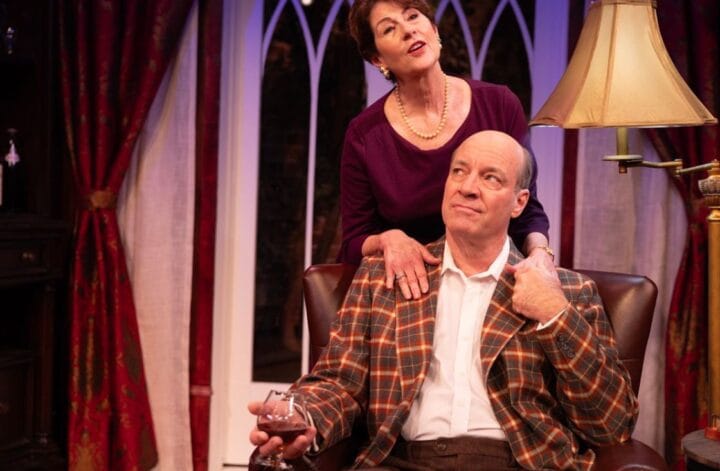If you live in South Florida and love theater, you are doubly blessed. Not only can you enjoy a variety of finely curated and produced world premieres, you can also revisit (or initially experience) award-winning, timeless classics that every serious theater-goer should see at least once in their lifetime.
For many, myself included, regular theater attendance often took a back seat to pressing career and family obligations. But that’s not all bad. Now in retirement, not only do I have the time (and disposable income) to enjoy more live theater, I’ve gained more life experience for a deeper understanding of, and sympathy for, a playwright’s troubled characters and their stories.
Popular Island City Stage is the latest local professional theater company to tackle one of the all-time “greats.” Edward Albee has been described as America’s greatest playwright of the last half of the twentieth century. And, like Island City’s departure from its usual fare, Albee’s Pulitzer Prize-winning play, A DELICATE BALANCE, broke new ground for the playwright.
Given the subject matter and our volatile times, it’s no wonder the company’s acclaimed associate artistic director Michael Leeds, who directed the play, found Albee’s 1966 masterpiece so compelling. Leeds explains:
“I’ve always loved A Delicate Balance. This multi-award-winning work was quite a departure for Edward Albee after his Who’s Afraid of Virginia Woolf. It’s dark and funny; a brutal comedy of manners. To me, the title refers to the delicate balance between life and death, love and hate, and how the balance can shift so easily and suddenly from sanity to madness.
I think the play is incredibly relevant in this age where the richest 1% of the world owns 95% of its wealth. A Delicate Balance is a reminder that no one is immune to the passage of time and the inevitability of death. I know it doesn’t sound it – but it’s also very funny!”

The director’s comments, alone, should suffice in whetting your appetite for this provocative, two-hour-and-40-minute (three acts with two intermissions) production. But I made sure to secure my ticket way earlier, on the strength of Albee (of course), but even more so because of the play’s exceptional, award-winning cast! Every actor is an A-lister – highly experienced and respected in South Florida theater circles.
The play opens to a well-appointed, late 1960s suburban living room – complete with two elegant wood-paneled cases: one for leather-bound books, the other, featuring a well-stocked bar that’s constantly in use. And while the home’s owners are often described as “middle class,” today they’d most likely be seen as “privileged” and rather wealthy. They complain about “the help,” appear to engage a full-time cook for their meals (bell summoned), as well as at least one maid to tidy up and even provide turn-down bed service at night. (Scenic designer Robert F. Wolin with property design by Denise Proffitt and construction by MNM Theatre Co./JB Green & Jordon Armstrong did a phenomenal job, even including a curved staircase and luxuriously draped glass doors which open up to a back garden.)
When ambient soft classical music is interrupted by tense, throbbing piano notes (almost, but not quite, like the opening of a horror film), we realize that despite the set’s “look” we are not embarking on a typical drawing-room comedy. This thought is confirmed when house owners, and main characters, Agnes (Patti Gardner) and Tobias (Tom Wahl) enter the scene. Agnes announces to her husband, who’s seated on a wingback leather chair, calmly sipping his drink, “I’m afraid I’ll lose my mind someday.” Now we’re off and running! Agnes has so much to say about her odd interior thoughts, the people in her life, and her feelings of being the indispensable “fulcrum” of the family.
It’s a good thing that much of what Agnes talks about (and she almost never shuts up) is strange and rather shockingly, acerbically witty. Patti Gardner is a true marvel in the role of Agnes which she executes so naturally in that upper-crust accent reminiscent of 1940s screen stars. All those lines! And she never misses a beat. She also manages to keep our interest in what’s next and the reasons behind her worries, which are slowly revealed throughout the play.
Tom Wahl, playing her mostly silent (at first) husband Tobias, is perfectly cast as the peacekeeper who tries to get his wife, and everyone else, to do their part. Like having Agnes apologize to her sister, whether or not it’s warranted – anything to bring down the hostile temperature in their home. He’ll accommodate and console his wife, to a point when asked, but mostly wishes to remain uninvolved. A cruel life blow, only revealed in Act III, has made him fear any deep attachment, though he – like all of the play’s six characters – desperately needs to love and be loved.
When pushed by Agnes to be the man of the house and make a decision in the final act, he spends all night grappling with his thoughts – facing raw truths of how he feels vs. how he should act, almost to the point of emotional breakdown. Earlier, we witnessed glimpses of festering frustration, passion, and anger beneath Tobias’s calm exterior when he spoke of his love/hate relationship with his cat. The role of Tobias becomes far more complex than it appears at first, and Tom Wahl makes all his facets look utterly believable.
Agnes’s younger sister Claire (Betty Ann Hunt Strain) is brazenly honest and seems to enjoy stirring things up. She’s a rather permanent fixture in the household, and while Tobias comments that she was “better” when attending that alcoholics group thing, Claire insists she’s not “a A-holic” … just “a drunk.” She stopped going to meetings, which she makes fun of, because she doesn’t “like the people.” There’s some sympathy (or more) between Tobias and Claire, with Agnes accusing her husband, “Your reflex is to defend everything Claire does.” His ongoing response: “We do what we can.”
More than once Agnes describes her feelings for Claire with: “The only thing sharper than a serpent’s tooth is a sister’s ingratitude.” She’s often stuck rescuing her sister after a bender and picking up the pieces. Here’s how Claire finally apologizes for her latest escapade: “I apologize. I am very sorry. I apologize for being an alcie.” Betty Ann Hunt Strain revels in her portrayal of Claire, the polar opposite of her sister, Agnes. She doesn’t give a hoot about social conventions, wears her alcoholism like a badge of pride, has a sharp mind and tongue, but appears stuck in an immature phase of rebellion. Her backstory remains somewhat of a mystery though, at the end, she voices a strange love circle among the play’s six characters wherein (like in a Shakepeare comedy) everyone loves the next person, but no one loves anyone back.
We arrive at the play’s pivotal dramatic scene which encapsulates existential dread. A feeling that’s highly relatable, given our ever-shifting climate (in all its associated meanings). A couple who are Agnes’s and Tobias’s best friends of 40 years (based more on proximity and membership at the same country club, it would seem, than shared interests) suddenly appear on their doorstep, expecting refuge from an inexplicable onset of “the terrors.” “We were scared,” says Edna (Margery Lowe). When her husband Harry (Christopher Dreeson) is repeatedly asked “What happened?” they continue to tremble and appear frozen in fear. Finally Edna responds with, “We thought of going to the club, but it gets so cold.” She starts crying, adding, “Nothing happened; it was like being lost. We couldn’t think of anywhere else to go but here.” (It was interesting to watch Lowe and Dreeson, famous for dynamic and assertive roles, perfectly portray this fearful, though ultimately demanding middle-aged couple.)
In a childlike voice, Edna soon asks: “Can I go to bed now please?” There’s no question of their spending the night because of their longstanding friendship. Though it comes as a shock to the house’s three residents when they suddenly depart – only to pack some bags and basically move in, length of stay undetermined. I was surprised when Agnes so easily offered them her daughter Julia’s room, given that she’d just gotten a call that Julia was on her way home because her fourth marriage was over.
Claire sardonically reflects how 36-year-old Julia (Sabrina Lynn Gore) is returning “right on schedule, once every three years.” Of course, her parents will accommodate her but they don’t really want her there (along with their, now, three other resident houseguests). Agnes tries to get Tobias to intervene – resentful that he hadn’t done so the past three times – and speak to Julia’s husband. He won’t. Meanwhile, he expects Agnes to spend hours comforting their daughter when she arrives, but Agnes is simply tired of propping up everyone in the family and refuses. Though she does, in fact, comfort Julia after her hysterical breakdown.
Julia is especially incensed at finding the “interloper” couple in her room, physically bans Harry’s access to the liquor cabinet and appears, literally, unhinged enough to shoot them off the premises. We are all shocked to attention at Sabrina Lynn Gore’s finely executed, high-octane violent scene. Happily, for once, “daddy” acts to deescalate what could have ended in tragedy. Then for one night, due to revised sleeping arrangements, it looks like a window has opened for real affection between the habitually physically estranged spouses. Sadly, that window quickly closes with everyone more comfortable (if somewhat more aware) with continuing the status quo.

levity with her aunt, Betty Ann Hunt Strain (as Claire, playing accordion). Photo by
Matthew Tippins.


